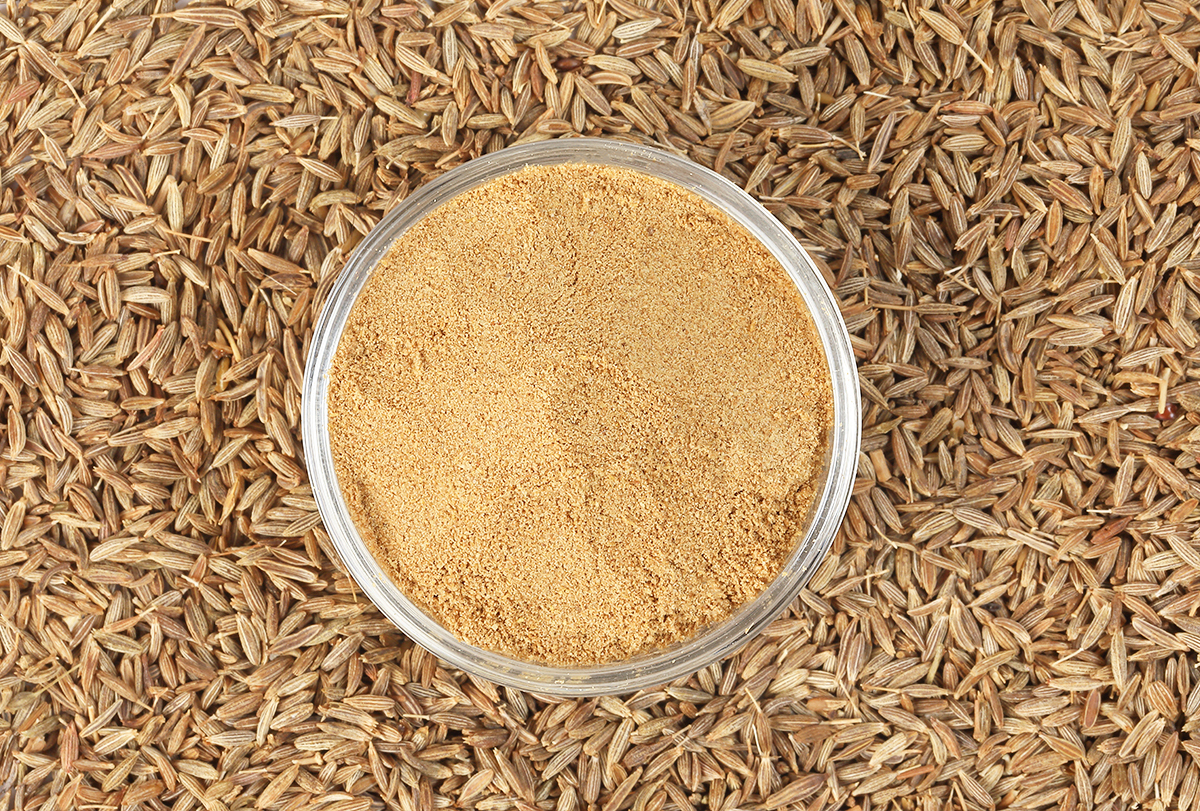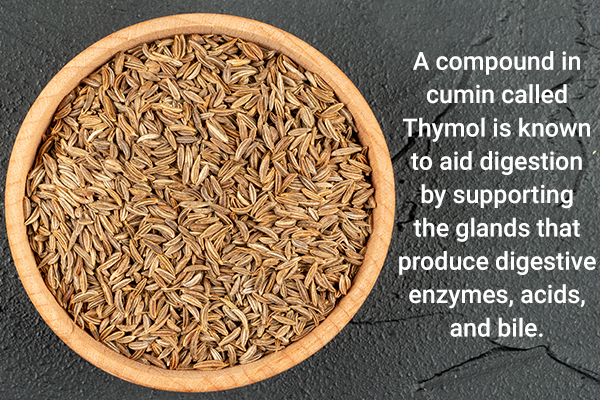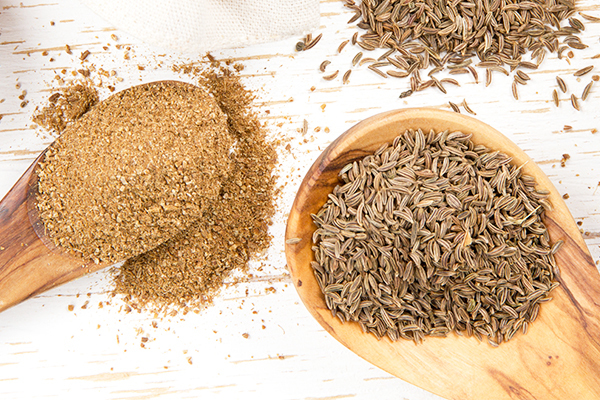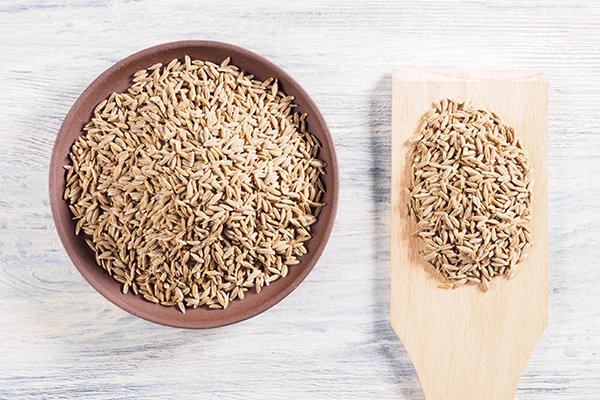In this article:
Cumin (Cuminum cyminum) is a member of the parsley family. These spicy seeds are gray in color and have an oblong shape. This popular spice originated in the area that stretches from the East Mediterranean to South Asia but it is now used all over the world.

Nutritional Content of Cumin
One tablespoon of cumin contains 23 calories; 3 grams of carbohydrate, most of which is fiber; 1 gram of fat; and 1 gram of protein. (1)
Cumin is a good source of iron, with 1 tablespoon providing 4 mg or 22% of your daily needs. It is also a good source of manganese, calcium, and magnesium.
Forms and Varieties of Cumin
Cumin seeds are often enjoyed either in whole or ground form. The seeds are dried and roasted and then ground into a powder, which is used in a variety of dishes and in traditional medicine.
Cumin oil and cumin essential oil are also employed in different ways. There are three varieties of cumin:
- Ground cumin (Cuminum cyminum L.) is known to help with flatulence, inflammation, and spasms. It also works as an antioxidant. (2)
- Black cumin (Nigella sativa) contains thymoquinone, which has potential pharmacological applications. (3)(4)
- Bitter cumin (Centratherum athelminticum L. Kuntze) has a sharper taste than the other varieties and has been used in traditional medicine. (5)
Reasons to Incorporate Cumin in Your Diet
Cumin has been used for centuries in traditional medicine and is believed to help with a variety of ailments. Research does support some of the cumin’s health properties, although evidence is still lacking on others.
1. Aids digestion

Cumin is a popular spice in Ayurvedic medicine and it is used for digestive issues such as indigestion, bloating, diarrhea, gas, morning sickness, stomach pain, and nausea.
A compound in cumin called thymol is known to stimulate the glands that produce digestive enzymes, acids, and bile. Cumin also helps improve stool consistency and frequency. (6)
Note: Excessive consumption of cumin can cause heartburn and acid reflux.
Cumin is found to benefit digestion and relieve some symptoms associated with digestive disorders.
2. Promotes weight loss
Cumin has been used for weight loss. In one study, cumin may have helped the overweight and obese women participants lose weight by reducing body fat, body weight, cholesterol level, and waist circumference. (7)
Another study found that cumin had the same effects as Orlistat (a pharmaceutical weight loss medication) on the weight and body mass index (BMI) of the overweight participants. (8)
Cumin has shown promise in aiding weight loss, but more research is needed about the type or amount to take.
3. Helps control diabetes
Cumin may help with diabetes control by influencing blood sugar levels. In a recent study, complications due to diabetes were improved by vitamin E and cumin essential oil. (9)
Another study found that cumin decreased the fasting blood sugar level, hemoglobin A1c, and inflammatory markers in patients with diabetes. (10) More studies are needed to understand how cumin works in individuals with diabetes. (11)
Note: Because cumin may influence blood sugar during and after surgery, avoid using cumin 2 weeks before surgery. It should be used cautiously if taken with medications that lower blood sugar levels.
There is evidence that cumin may be beneficial for diabetes by aiding in the control of blood sugar levels.
ALSO READ: Healthy and Harmful Foods for Diabetics
4. Lowers cholesterol
This earthy spice may help manage cholesterol levels and promote a healthy cardiovascular system by decreasing levels of total cholesterol and LDL cholesterol, sometimes referred to as “bad cholesterol.” (12)(13)
Other Possible Benefits
While there is some evidence about the following claims, more research is needed to validate if cumin truly has an effect on these conditions.
- Stress reduction and memory support: One animal study found that cumin works as an antioxidant, and cumin extract may help to reduce stress and enhance memory. (14)
- Anti-inflammatory and analgesic: A few studies have demonstrated this potential benefit of cumin. (15)
- Urinary and sexual health: Cumin may act as a diuretic, decrease bloating, and increase sexual desire. A few studies done on animals suggested that cumin may improve sperm count. (16)
- Anti-cancer effects: Cumin varieties are also being studied for their potential anti-cancer properties. (17)
Storage and Usage of Cumin

Ground cumin loses its flavor more quickly than whole seeds. Whole seeds and powder should be stored in a glass container with a tight seal and kept in a cool, dry, dark place.
Ground cumin will keep for 6 months and whole seeds will keep for about 1 year. The earthy flavor of cumin goes well with beans, legumes, rice, and vegetables.
Cumin can be used as a substitute for salt to add flavor to your meals, as excessive salt consumption can lead to high blood pressure. You can also enjoy a cup of cumin tea by boiling whole seeds in water and steeping for 8–10 minutes before drinking.
Safety and Side Effects of Cumin
Cumin is generally considered safe to consume. Only a few trials found side effects of cumin treatment. However, chronic use of cumin may increase the risk of bleeding, breathing complications, and dermatitis.
Pregnant and breastfeeding women and those with ulcers or respiratory illnesses should use caution when taking cumin. (18)(19) An allergic reaction to cumin is rare. However, there have been a few case reports of anaphylaxis in reaction to cumin.
Drug Interactions With Cumin
Consuming cumin in excessive amounts when taking diabetes medications may have an additional blood sugar-lowering effect and cause your blood sugar to drop too low.
Cumin may also interfere with antibiotics, anti-inflammatory medications, and anti-seizure medications. Moreover, cumin can cause a blood-thinning effect, and this is important to note when taking medications that slow blood clotting.
Therefore, always speak with your doctor or pharmacist before taking cumin with other medications.
Expert Answers (Q&A)
Answered by Ms. Lily Chen, MS, RDN, APD, FAND

There is not enough evidence to establish a daily recommended intake of cumin at this time. Cumin used in everyday cooking is most likely safe, while cumin supplementation should be monitored closely.
There is not enough evidence to determine a safe level of cumin to consume in healthy individuals or pregnant women. Natural foods are not always safe, and the dosage of intake is important to take into consideration.
Drinking adequate fluids is a great strategy to help with weight loss. This can be in the form of cumin water or other types of fluids (without additional sugars).
The key to getting rid of a hangover is drinking adequate fluids. Cumin has not been shown to have the same effect.
When consumed alongside an overall healthy diet, cumin can provide health benefits as it is packed with a variety of beneficial compounds such as essential fatty acids, polyphenols, and flavonoids.
Some studies have shown a link between cumin and decreased cholesterol and triglyceride levels. Cumin is a spice that can be easily added to your dishes and different types of cuisines. Feel free to experiment with this spice as well as other spices you might not have used before.
Final Word
Cumin is a popular spice that is well-loved for its unique flavor. It has many nutritional properties and offers many health benefits. Therefore, it can be a welcome addition to your diet.
Excessive cumin consumption may be harmful to your health, especially if you take medications for diabetes or seizures. Always talk to your doctor before taking new herbal supplements or oils.
- Was this article helpful?
- YES, THANKS!NOT REALLY


